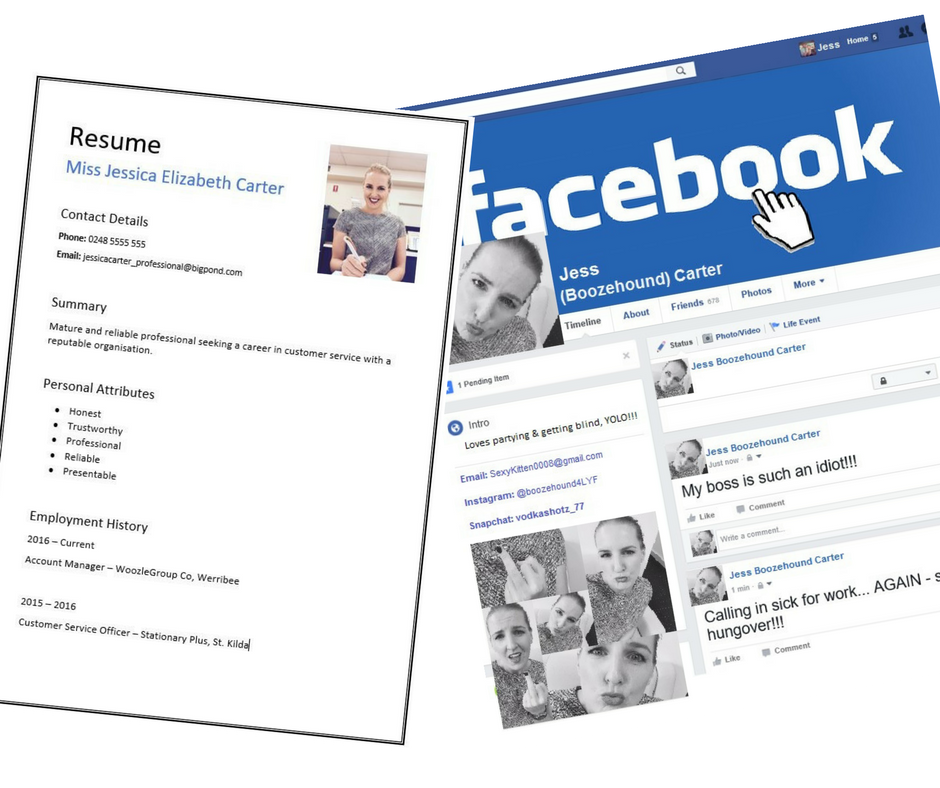Gone are the days where we kept our personal and professional lives separate. Everyone has their own opinion on the blurring of the lines between what we share on social media and how it relates to and impacts on what we do in our professional lives. As a recruiter in 2017, it is standard practice to check out potential candidates on social media. Whether you think it is right or wrong, the reality is that it happens. And it’s highly likely it’s impacting your chances of landing a job. I have experienced employers not wanting to interview a candidate or not offering them a job because of what they have found on a candidate’s Facebook page.
Hiring for values, culture fit and character is now equally, if not more important than skills and qualifications. If this is what employers are assessing a potential candidate on, it’s only natural to expect them to do their own research online to assess your values, character and potential culture fit. If you are representing a company, if you are putting on your Facebook page that you work at a particular company, if that company is promoting you as a representative of the business and promoting certain values, that potential employer is going to want to make sure you can walk the talk. Are you just telling an employer what they want to hear in an application letter and resume or are you pretending to be someone you are not?
It’s all about how you are perceived by the person who is checking out your social media profile. And of course everyone interprets what they see and read differently. What do employers really think of your Facebook page?
Are you professional?
Professionalism is more than just rocking up to work and acting in accordance with a code of conduct. When a potential employer looks at your Facebook page they are looking at what you have to say and how you say it. Posts filled with foul language, frequent rants, overstated opinions and attention grabbing posts are not going to win you an employer. It also comes down to frequency of this kind of content. We are all entitled to opinions and I’d say an employer wants someone who has an opinion and will stand up for what they believe in, but it can be about how you get your point across in your post. Essentially you are being assessed on your communication skills and your influencing and negotiation skills. If swearing and ranting is how you try and get your point across how are you going to handle sitting at the board room table discussing a work matter that isn’t going your way?
Presentation. First impressions matter; they matter when we meet in reception for that first interview and they matter when we review your Facebook page. Every photo you post doesn’t have to show you in a suit or in a work context, but let’s be honest; post after post of selfies with pouty lips where I can see more of your cleavage than your face, or posts where you have a t-shirt with an image or wording that could be considered offensive is probably not going to help you get to the interview table. Your potential employer is thinking how you are going to present yourself at work, and while a uniform might solve a lot of those problems you are still going to be representing the business outside of work hours when you don’t have that uniform on. Depending on your role and particularly for client focussed roles, chances are that stakeholders of your potential employer will one day check out your social media profile. Basically, your potential new employer is thinking ‘is this profile what I want my customer to see?’
There is no need to pretend to be plain Jane or boring Bob on your Facebook page. It is all about moderation and perception. The simplest way to handle this is to adjust your privacy settings, limiting what an employer can see of your profile. If you are about to launch yourself in to the world of searching for work, try and put yourself in the employer’s seat. Take in to consideration the industry they operate in, what they stand for, their values and how they present themselves online and look at your social media profile from that perspective. Will an employer like what they see and would they be proud to have you represent them in their marketplace? Getting an independent opinion from a family member, friend or someone in the business world like a recruiter may be worthwhile if you are in doubt.
And if you are reading this thinking my Facebook page is my personal life and has nothing to do with work, that’s absolutely fine. Just be prepared for it to impact your job search if your professionalism and presentation is questionable from an employer’s perspective, or maybe that employer just isn’t the right fit for you.


